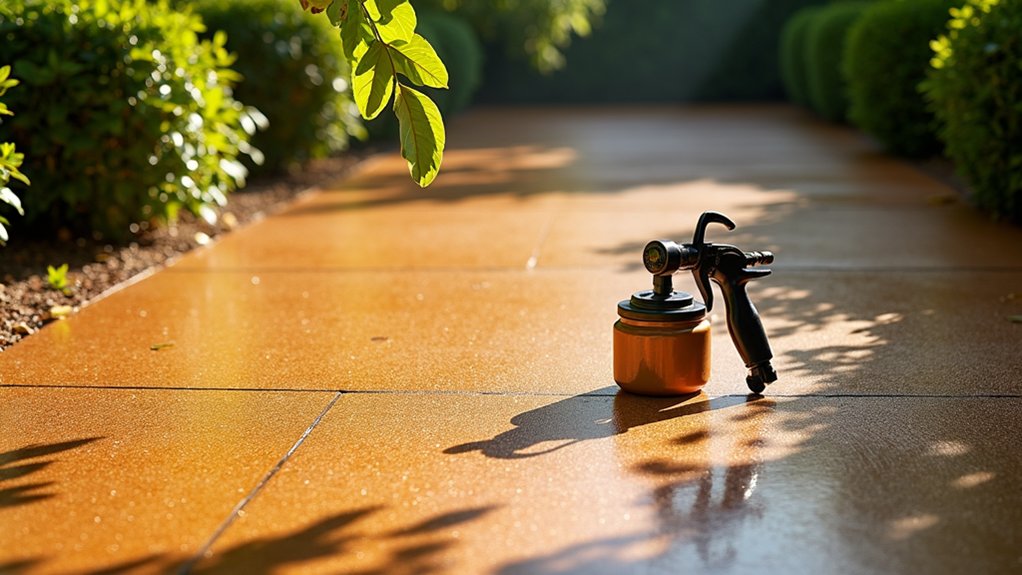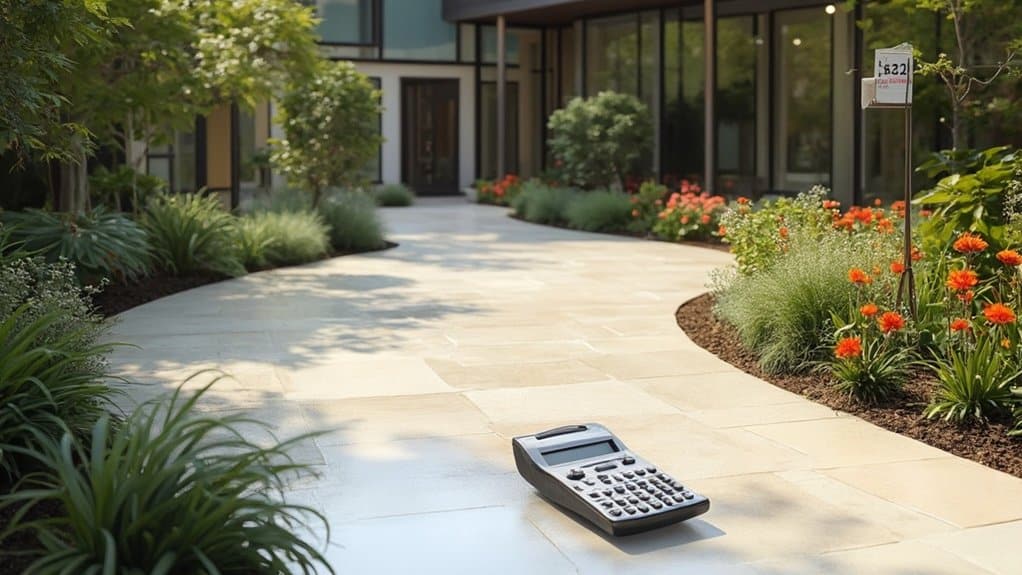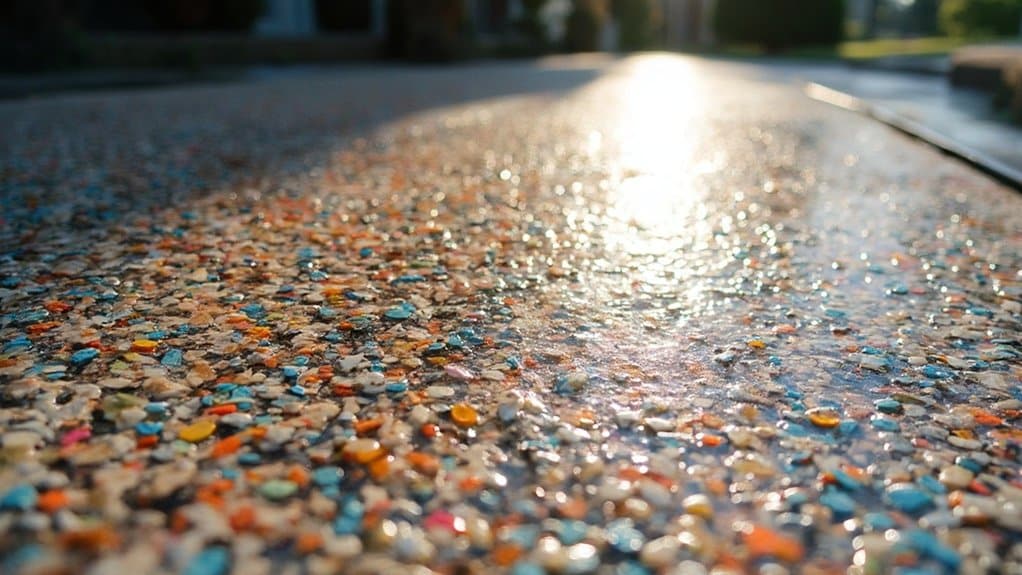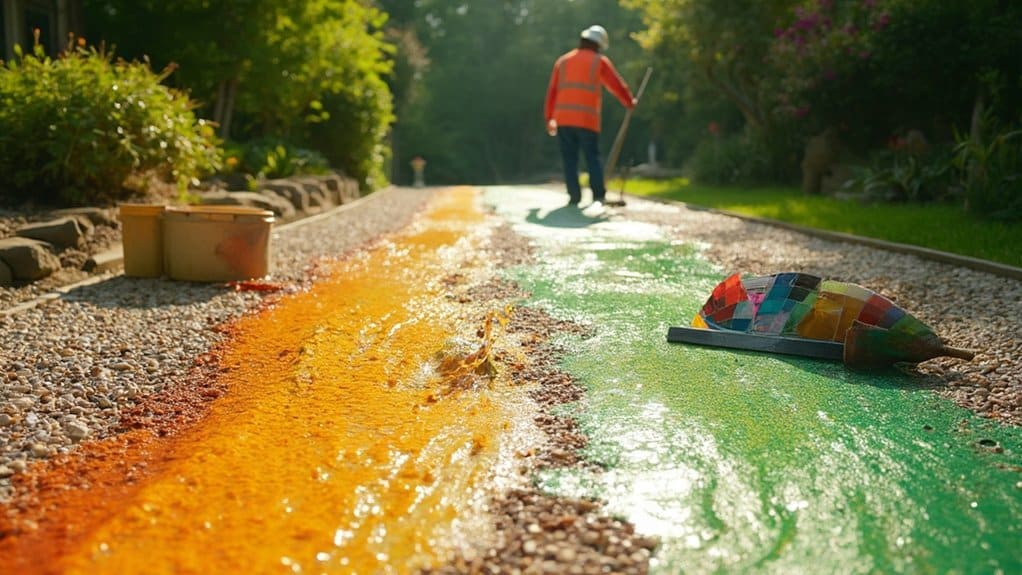The best sealer for your resin driveway will depend on your requirements. Acrylic sealers provide UV protection and a clear finish, while penetrating sealers excel at moisture resistance. For areas with heavy foot or vehicle traffic, polyurethane sealers are both durable and flexible. Consider top brands like SuperSeal30 for a glossy appearance or Ghostshield Siloxa-Tek for reliable, water-based protection. Ensure you prepare the surface properly before applying any sealer. With the right choice, you can keep your driveway looking its best!
Table of Contents
ToggleKey Takeaways
- Acrylic sealers offer good UV resistance and a clear finish, making them a popular option for resin driveways in the UK.
- Penetrating sealers provide excellent moisture protection, ensuring long-lasting durability for outdoor surfaces.
- Polyurethane sealers are tough and flexible, making them perfect for high-traffic areas and extending the lifespan of your driveway.
- Water-based sealers are environmentally friendly with low VOC levels, making them a safe choice for home use.
- Regularly resealing with quality products not only enhances the appearance but also increases the longevity of resin driveways.
Types of Sealers Suitable for Resin Driveways
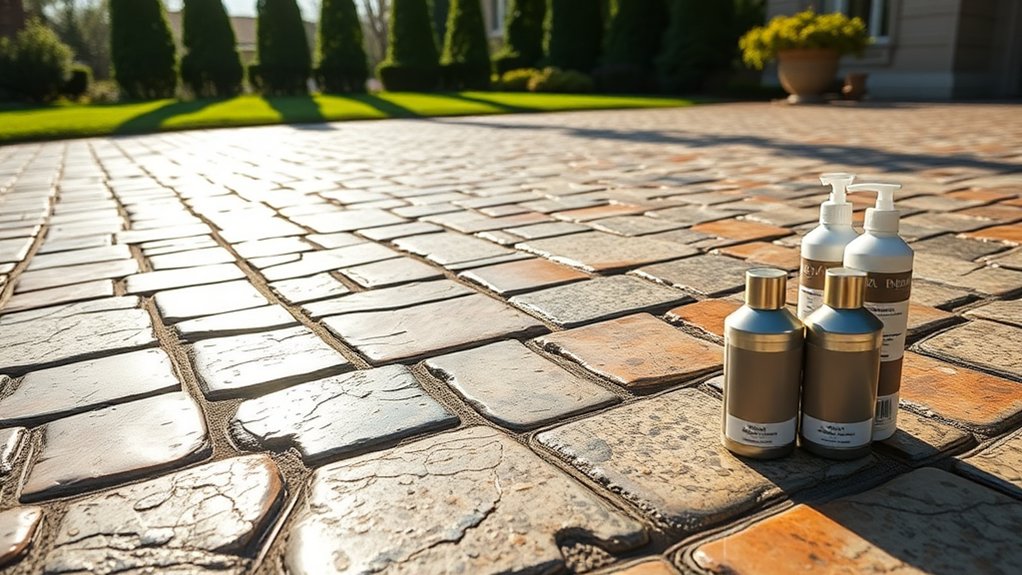
When selecting the right sealer for your resin driveway, it’s crucial to understand the various options to make an informed decision.
Acrylic sealers are a popular choice, offering good UV resistance and a clear finish that enhances the appearance of your driveway without changing its colour. Additionally, penetrating sealers provide excellent moisture protection and are suitable for outdoor surfaces prone to corrosion. Choosing the right sealer can significantly impact the overall durability of your driveway.
Conversely, polyurethane sealers are known for their durability and flexibility, making them perfect for high-traffic areas. They can handle chemical spills and adapt to minor surface movements, providing long-lasting protection.
Water-based sealers are another option, as they’ve low VOC levels and are more environmentally friendly, making them suitable for DIY projects. Each type has its advantages, so consider your specific needs when choosing the best one.
Key Performance Metrics for Sealer Selection
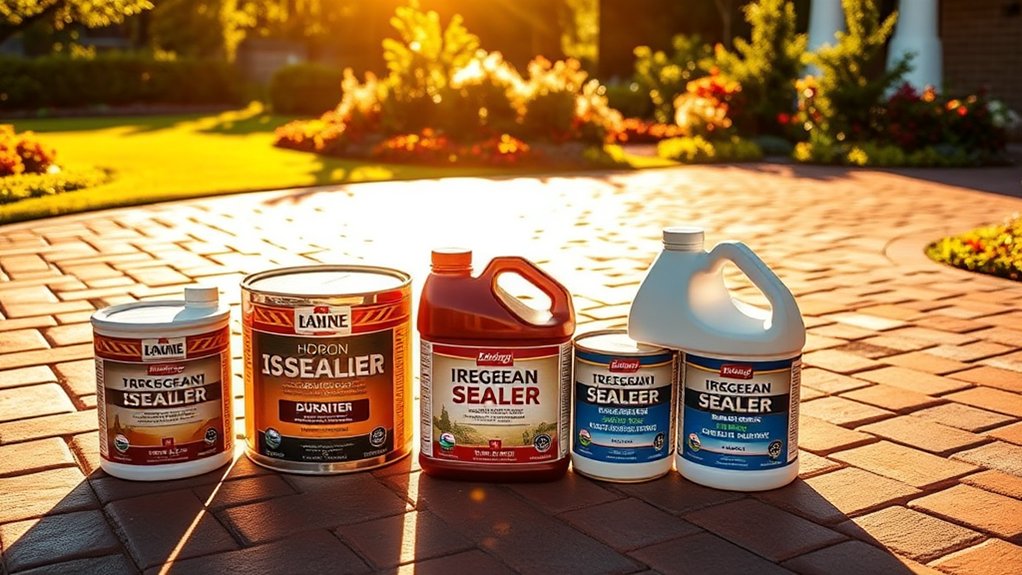
Choosing the right sealer for your resin driveway is essential for its durability and performance. Start by assessing adhesion; the bond strength between the sealer and the surface is crucial. Ensure the surface is properly prepared to enhance this bond and reduce the risk of failure. Look for sealers that provide excellent weather and chemical resistance, so they can withstand the British climate and everyday spills. Consider how often the sealer needs to be reapplied; some high-quality options can last several years with the right maintenance. Lastly, check if the sealer complies with industry standards, as this can indicate its reliability and safety. It’s important to note that film-forming sealers do not penetrate concrete substrate effectively, which can affect their performance over time. Regular resealing of resin driveways can significantly improve their longevity and appearance, making it a vital aspect of driveway maintenance. Selecting a sealer that meets these criteria won’t only keep your driveway looking good but also protect your investment for years to come.
Top-Rated Sealer Brands and Models
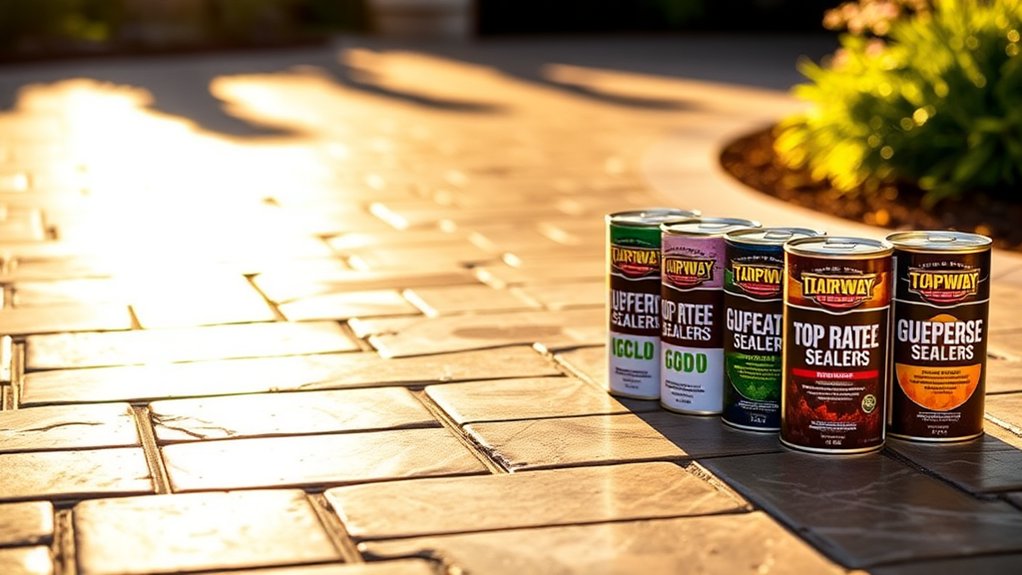
Choosing the right sealer for your resin driveway can significantly affect its durability and appearance. Here are some top-rated brands to consider:
- SuperSeal30 is renowned for its deep wet look and high gloss finish.
- Supreme Shield SB-600 enhances natural colour while allowing the surface to breathe.
- For added durability, Foundation Armor Concrete Sealer is a reliable acrylic option.
- Ghostshield Siloxa-Tek offers a penetrating, water-based seal for robust protection.
- If you’re looking for eco-friendly choices, Eco-Tuff Clear Coat is worth considering. Furthermore, using a sealer can stabilize joint sand to minimize weed growth and erosion, ensuring your driveway remains in excellent condition. This is particularly important because resin driveways discourage weed growth, reducing the need for ongoing weed control expenses.
To ensure you make the best choice, take time to read reviews and compare products.
Each of these sealers has distinct benefits designed to enhance and protect your driveway effectively.
Application Methods and Considerations
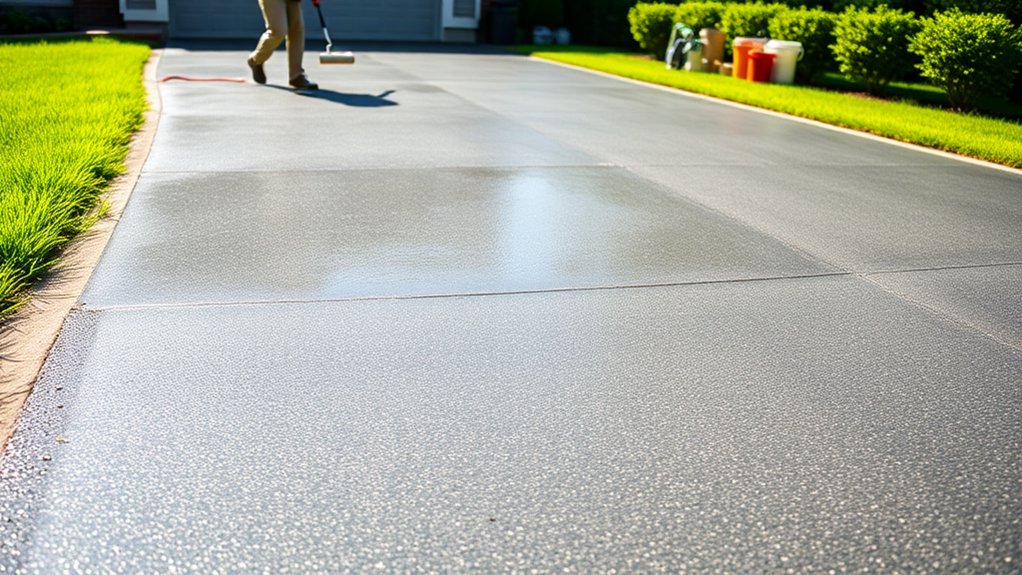
For the best results with your resin driveway, proper application methods and considerations are essential.
Begin with thorough surface preparation: clean the area using brooms or blowers, ensuring it’s completely dry with no standing water. Timing is crucial—avoid applying sealers in temperatures below 10°C (50°F) or during wet weather.
When it comes to application, use sprayers for larger areas and brushes for edges, working in manageable sections. Maintain a steady pace to ensure an even thickness, and allow the first coat to dry before applying a second coat at a right angle.
Be sure to protect nearby areas from overspray and wear appropriate safety gear throughout the process. Following these guidelines will help ensure a long-lasting seal for your driveway.
Cost, Coverage, and Value Considerations
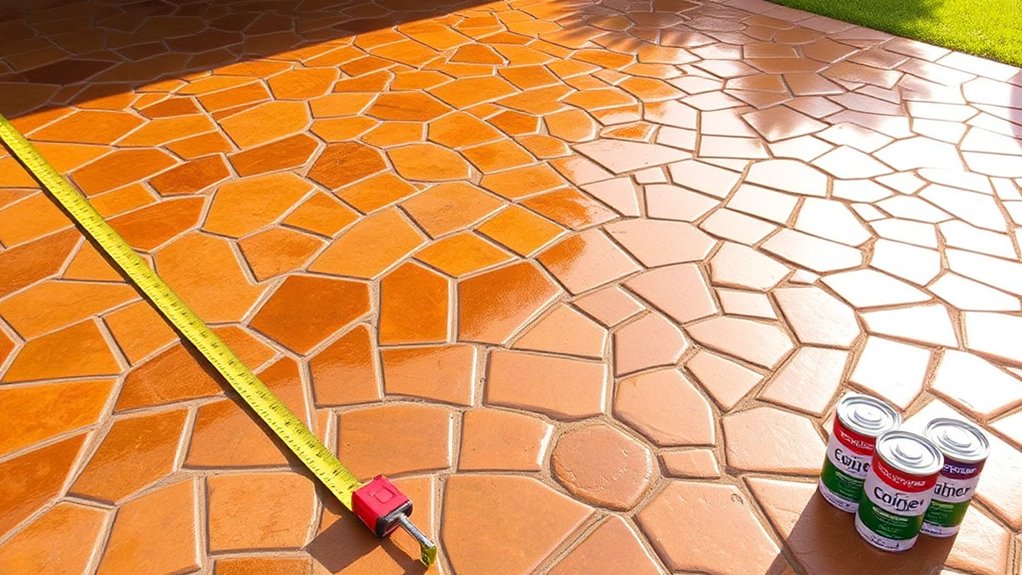
When evaluating the cost, coverage, and value of sealing your resin driveway, it’s important to grasp the key aspects of each factor.
On average, professional sealing can cost between £1 and £2 per square foot, while premium resin installations can range from £11 to £17 per square foot. Coverage can differ depending on the product, with higher-end sealants providing better protection but covering less area.
In terms of longevity, asphalt emulsion sealers typically last up to four years, whereas professional seal coatings can significantly extend this lifespan.
Overall, investing in a resin driveway offers long-term value thanks to its durability and low maintenance requirements, even if the initial cost is higher.
Weighing these factors will help you make the best decision for your driveway.
Frequently Asked Questions
How Often Should I Reapply Sealer to My Resin Driveway?
You should reapply sealer to your resin driveway every 2-5 years, depending on how much it’s used and the weather conditions. Regular maintenance is key to prolonging the life of the sealer. Look out for signs like fading colour or cracks to know when it’s time for a reapplication.
Can I Use a Pressure Washer to Clean Before Sealing?
Yes, you can use a pressure washer for cleaning. Just keep these tips in mind: use a low setting, select a wide nozzle, and opt for a mild detergent to protect your resin surface during the process.
Will Sealing Change the Color of My Resin Driveway?
Sealing your resin driveway can affect its colour. The type of sealer you select plays a key role. For instance, a glossy sealer can make the colours pop and look more vibrant, while a matte sealer may keep a more muted appearance.
Is Sealing Necessary for Newly Installed Resin Driveways?
Sealing is essential for newly installed resin driveways. For instance, Sarah observed that the vibrant colours of her driveway were fading over time. By sealing it early, she not only enhanced its longevity but also benefited from increased durability and improved appearance. Sealing helps protect your investment for years to come.
Can I Apply Sealer in Cold or Rainy Weather?
You shouldn’t apply sealer in cold or wet weather. Cold temperatures can cause poor adhesion, while rain can wash away the sealer or hinder proper curing. This affects the sealer’s effectiveness and lifespan. For best results, choose a dry, mild day for application.
Conclusion
Selecting the right sealer for your resin driveway is crucial for both durability and appearance. Consider factors such as performance, brand reputation, and application methods to ensure your investment is well protected. Picture a family gathering where the children can play on a neatly sealed driveway, free from stains and wear—this is the reassurance you gain from choosing a quality sealer. A good seal makes a real difference, keeping your driveway looking immaculate for years to come.
Not sure how much a resin driveway will cost in 2025? Discover the key factors influencing pricing and installation that Read more
Wondering if you can lay a resin driveway over concrete or tarmac? Discover the essential tips for a successful installation Read more
Discover how to create a stunning DIY resin driveway with our step-by-step guide—your perfect outdoor upgrade awaits!

